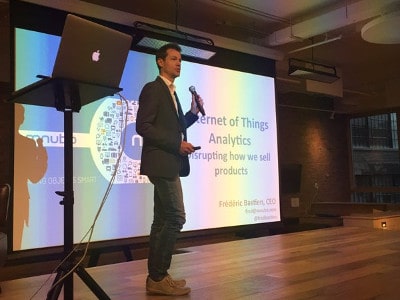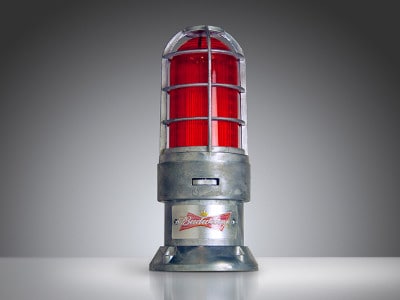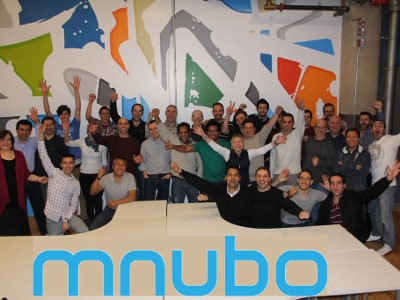

Frédéric Bastien, CEO of Montreal company mnubo, presented at an MTL+Ecommerce meet-up at Montreal’s Shopify headquarters last week, making an Internet of Things analogy that people working in e-Commerce would understand.
“Would you launch a website to sell things without analytics? No one would do that,” he tells the audience, suggesting that the same data analysis that is applied to websites today will become the norm for product manufacturing, all the way through each product’s lifecycle, collecting data to build new forms of business value, and to improve each product.
Until quite recently, a website was basically a digital business card, with no back-end analytics whatsoever, which is unthinkable now. And it will be just as unthinkable five years from now to sell a product that isn’t talking to the cloud.
The job of an e-Commerce worker is finished at the moment of conversion, or the point at which a customer buys a product.
But for Bastien and his company, data produced during a product’s entire lifecycle are bound to steer decisions that will affect product manufacturers, and therefore the people who market those products as well.
In the minds of the public, the Internet of Things has associations with a bunch of novelty products, like nagging personal fitness devices or umbrellas that blink at you if rain is forecast.
But for Bastien, and for watchers of the space, real value lies in how connected devices are going to transform both industry and consumer products, such as wristwatches, washing machines, home cameras, water pipes, beer fridges, tractors, farm controllers, manufacturing robots, mining equipment, and everything else, in ways that most consumers will not notice.
“The real big business, or at least it’s a big part of our business, is the industrial side. Agricultural equipment, manufacturing equipment, building equipment. Those are less sexy, but the return on investment is quite good,” he says.
Bastien tells the audience about a convention that he attended last week, which featured IoT-enabled LED lights that integrate sensors capable of detecting Bluetooth, Wi-Fi or NFC in your smartphone, so that retail spaces can watch consumers wandering through a physical space to within 10 centimeters of their actual position.
Stories like that always get a rise out of an audience, already paranoid that their iPhones are tracking their every move.
But mnubo’s play is not in consumer spaces, or individual shop owners, farmers, and building managers, but on equipment manufacturers themselves.
“Within the next 10 years, any product that runs on electricity will have an internet connected version,” he says. “Every product is going to be connected. It’s just going to be a product that happens to generate data for the maker, so that they can build better products.”
As for the size of the market, it’s obviously in most companies’ interest to plump the stats a little.
Cisco estimates that the global value of the Internet of Things by 2020 will exceed $14 trillion, that 50 billion things (excluding PCs, smartphones and tablets) will be connected, and that 20 zettabytes (10-21 bytes) of data will be generated.
“There are lots of stats are flying around on IoT,” says Bastien. “You can’t believe any of them, but they’re all big.”
“The real big business, or at least it’s a big part of our business, is the industrial side. Agricultural equipment, manufacturing equipment, building equipment. Those are less sexy, but the return on investment is quite good.” – mnubo CEO Frédéric Bastien
And mnubo is set to grow along with that nascent market, selling their Data Science as a Service platform to equipment manufacturers.
mnubo has just launched its SmartObjects Analytics service, called Maker Edition, that provides a platform for product manufacturers to gain insight on connected product usage.
Currently, mnubo has more than 50 employees working out of the Nordelec building in Montreal’s Griffintown neighbourhood.
Just before sitting down to talk with Cantech Letter, we joked about some of the more absurd examples of Internet of Things technology that tend to get a lot of attention in tech journalism, leading me to ask him where the hype gets separated from the action.
That popular conception of the Internet of Things has more to do with the novelty aspect of it, like “Put a chip in it” of whatever, but from an investment perspective, you’re selling “Data Science as a Service” to mostly industrial clients. That’s where the exciting stuff is, isn’t it?
It is. I mean, there’s a lot of exciting things happening in the consumer IoT space. Not so much for the connected umbrella, but mainly for product improvement. Huge things are going on there. The smart home is one of the fastest growing sectors. But yeah, investors like to see ROI. Clear, easy to demonstrate ROI. In industrial, it’s just obvious. That’s why the take-up for us is really good there. We don’t have the same volume, but we have a lot more value.
Can you give us a sense of your client base? A lot of companies who deal in something specific like, say, data security tend to specialize in a particular vertical, like data security for health care, for example. But you guys seem to be selling to everyone.
We’re addressing five verticals, out of maybe 30 potential IoT verticals. Our platform can address any of the 30, but from a commercial standpoint, we’re going after five. On the industrial side, it’s agriculture, buildings and manufacturing. Those are the three B2B that we’re going after. Using Ag as an example, there’s a company called AGCO. If you look at agriculture equipment makers, there are four big companies, Caterpillar, John Deere, UTC and AGCO, all billion-dollar companies. AGCO has a division making products, and they’re our customer. So these are the type of deployments where the ROI is.
Yes, ag tech is obviously one of those huge, interesting sectors.
A lot of companies who go into ag tech think of the farmer. They’ll try to sell the farmer on yield optimization and things that are smart. That’s not our play. That stuff is useful. But the products that are used in the field are so non-optimized, so faulty, so badly done, badly installed, that you need to address the product makers to help them make a better product. Same with buildings. All these companies selling building analytics, “I’ll save you 20% on energy costs.” But the boiler, the HVAC system, the air conditioning, they’re totally un-optimized. And they’re totally unaware that this data is 50% bad. So we go to the makers and tell them, “Look, we’ll help you create value out of your data, out of your product.” And then, once that step is done, let’s integrate it and build energy optimization and farm yield optimization and so on, but that’s just the second layer.
So that’s the value proposition that you’re approaching clients with, is saving them X amount of untold wasted potential that’s lying in farmers’ fields and in buildings. Can you elaborate on how you would optimize a building?
For me, it’s building equipment. We’re not providing M2M building analytics. Our platform is made for companies that make water heaters, boilers, chillers, lighting, and so on.
Okay, for those companies, what is the scale of companies that you’re pitching? The mere term “Big Data” strikes panic and fear into most companies, regardless of their size, but how do you pitch them on extracting value from a swarm of data?
I like to say that most companies have spent the past decades building things like metal. And now they’re being asked to integrate HTTP stacks. It’s just out of their game. The zero to $20 million company, especially in the consumer IoT space, they typically go towards our self-serve product. Then the $20 million to $200 million company is our sweet spot, in terms of the industrial IoT maker. $200 million and up, we’re still interested in selling to these guys, we have some customers in that category, but those companies have a choice. They can hire, build it in-house, acquire a company, whatever they want. We still win deals there, but our sweet spot is a company that is in that middle range, in that they’re a sizable company but they can’t hire 15 or 20 data scientists.
There have been a lot of companies who talk up Big Data and the Internet of Things who later discover that it’s much easier to hire or acquire a team with a deep research academic backgrounds, after they’ve tried and failed to build something in house and realize that Big Data is hard. It’s not easy to do.
Yes, it’s really hard. It’s much harder than people think. We have so many customers that spend six months collecting data, and then realize, “We’re just paying AWS rental fees. That’s the only thing we get out of it, paying a bill in the U.S.” So they move it to us. Our two first plans, the customer uses the product as-is. There’s no customization at all. The third plan, the premium plan, they get access to our data science team. We can train online machine learning specific to their problem. In the first two plans, they can turn on product scoring, configure it. Yes, there’s machine learning behind, but it’s not showing for them. It’s like Google Analytics for connected objects. The second plan has libraries and insights for products. But they’re generic in the sense that they apply to anyone, but they’re still IoT focused. You’ve got a user engagement score, you’ve got time-to-target, replenishment features, things like that. In Ag, customers tend to go to premium, especially for soil sensors and all these things. It’s so specific to that sensor in the field in this particular place.
What developing markets do you see for your company in the future?
Right now, Asia is where the growth is. The U.S. and Canada have been our main markets. We’ve won things in Asia, in Australia, but we see the profiles of Taiwan and Hong Kong and China, Singapore and Thailand as big electronics manufacturers, but not as savvy from a Big Data and software point of view. So these are great markets. We’re attacking them with partners.
Leave a Reply
You must be logged in to post a comment.




 Share
Share Tweet
Tweet Share
Share




Comment